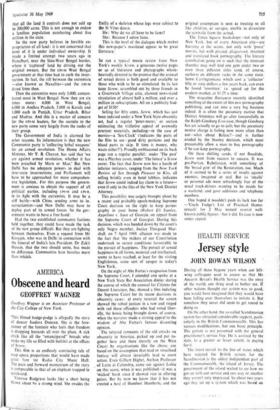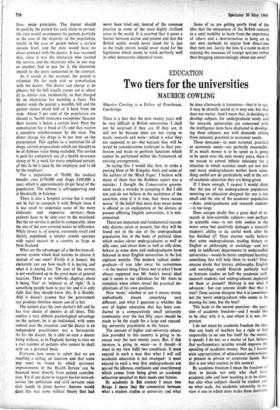Jersey style
HEALTH SERVICE JOHN ROWAN WILSON
During all those bygone years when our left- wing colleagues used to assure us that Mr Aneurin Bevan's Health Service was the envy of the world, one thing used to bother me. ff. other nations thought our system was so good, you would have imagined that they would have been falling over themselves to imitate it. But somehow they never did seem to get round to doing so.
On the other hand, the so-called Scandinavian system has attracted considerable support, parti-' cularly in the British Commonwealth. This has various modifications, but one basic principle.' The patient is not presented with the general practitioner's service free. He is assisted by the state, to a greater or lesser extent, in paying' for it.
The latest recruit to the line of states which have rejected the British system for the Scandinavian. is the oldest independent part of the Commonwealth, the island of Jersey. The government of the island waited to see how we got on with our service and one way or another they weren't very impressed. So about two years ago they set up a system which was based on
thre.:. main principles. The doctor should be paid by the patient for each claim to service; the state would recompense the patient, partially in the case of the majority of the population, totally in the case of people below a certain income level; and the state would have no direct contract with the doctor. It was reasoned that, since it was the electorate who wanted the service, and the electorate who, in one way or another, had to pay for it, the electorate should be the party concerned in the contract.
As it stands at the moment, the patient is refunded lOs for each visit or consultation with the doctor. The doctor can charge as he pleases, but his bill usually comes out at about £1 (a similar rate, incidentally, to that charged by an electrician for mending a fuse). The doctor sends the patient a monthly bill and the patient claims about half of it back from the state. About 5 per cent of the population are classed as 'health insurance exceptions' because their income is below a certain level. Here the consultation fee is fixed at 15s and they receive a complete reimbursement by the state. The direct charge for drugs is 4s per item on the prescription. This applies to a restricted list of drugs, certain preparations which are thought to be of dubious value being excluded. The service is paid for completely out of a health insurance stamp of 4s. a week for every employed person; of this 2s 6d is paid by the employee and Is 6d by the employer.
For a population of 70,000, the medical benefits cost £170,000 and drugs £100,000 a year, which is approximately £4 per head of the population. The scheme is self-supporting and is financially in balance.
There is also a hospital service but it would not be fair to compare it with Britain since it is too small to undertake some of the more elaborate and expensive services—those patients have to be sent over to the mainland. But the GP service is perfectly comparable, since the size of the area covered makes no difference. While Jersey is, of course, extremely small and thickly populated, a similar system operates with equal succesS in a country as large as New Zealand.
What are the advantages of a fee-for-item-of- service system which lead nations to choose it instead of our own? Firstly it is honest; the electorate can see how much it is paying and what it is paying for. The cost of the service is not swallowed up in the great mass of general taxation. There is no rubbishy claptrap about it being 'free' or 'enjoyed as of right.' It is something people have to pay for and it is only right that they should know this. It is flexible. And it doesn't assume that the government can produce limitless means out of a hat.
The patient pays his own doctor's bill and he has free choice of doctors at all times. This confers a very definite psychological advantage on the patient; he is an individual, with some control over the situation, and the doctor is an independent practitioner, not a bureaucrat. As for the doctor, he is able to earn a decent living without, as in England, having to take on a vast number of patients who cannot be dealt with on a personal basis.
Everyone now seems to admit that we are reaching a ceiling on taxation and that some way must be found by which necessary improvements in the Health Service' can be financed more directly from patient contribu- tion. Yet if one dares to suggest fee-for-item-of- service the politicians and civil servants raise their hands in pious horror. Anyone would think this was some wildcat theory that had never been tried out, instead of the common practice in some of the most highly civilised areas in the world. It is asserted that it poses a barrier between doctor and patient and that the British public would never stand for it, just as the trade unions would never stand for the legislation which seems to work perfectly well in other democratic industrial states. Some of us are getting pretty tired of the idea that the uniqueness of the British consists in a total inability to learn from the experience of others and a determination to hang on to our own methods no matter how disastous they turn out. 3urely the time h .s come to start copying the successes of foreign systmns rather than bragging unconvincingly about our own?



































 Previous page
Previous page